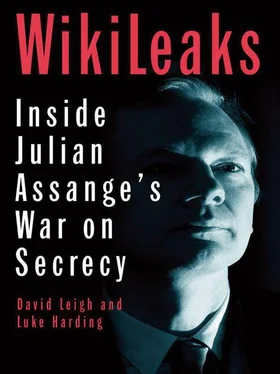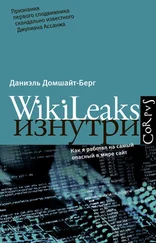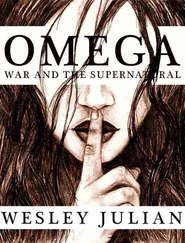Harding, Luke - WikiLeaks - Inside Julian Assange's War on Secrecy
Здесь есть возможность читать онлайн «Harding, Luke - WikiLeaks - Inside Julian Assange's War on Secrecy» весь текст электронной книги совершенно бесплатно (целиком полную версию без сокращений). В некоторых случаях можно слушать аудио, скачать через торрент в формате fb2 и присутствует краткое содержание. Жанр: Старинная литература, на английском языке. Описание произведения, (предисловие) а так же отзывы посетителей доступны на портале библиотеки ЛибКат.
- Название:WikiLeaks: Inside Julian Assange's War on Secrecy
- Автор:
- Жанр:
- Год:неизвестен
- ISBN:нет данных
- Рейтинг книги:3 / 5. Голосов: 1
-
Избранное:Добавить в избранное
- Отзывы:
-
Ваша оценка:
- 60
- 1
- 2
- 3
- 4
- 5
WikiLeaks: Inside Julian Assange's War on Secrecy: краткое содержание, описание и аннотация
Предлагаем к чтению аннотацию, описание, краткое содержание или предисловие (зависит от того, что написал сам автор книги «WikiLeaks: Inside Julian Assange's War on Secrecy»). Если вы не нашли необходимую информацию о книге — напишите в комментариях, мы постараемся отыскать её.
WikiLeaks: Inside Julian Assange's War on Secrecy — читать онлайн бесплатно полную книгу (весь текст) целиком
Ниже представлен текст книги, разбитый по страницам. Система сохранения места последней прочитанной страницы, позволяет с удобством читать онлайн бесплатно книгу «WikiLeaks: Inside Julian Assange's War on Secrecy», без необходимости каждый раз заново искать на чём Вы остановились. Поставьте закладку, и сможете в любой момент перейти на страницу, на которой закончили чтение.
Интервал:
Закладка:
The challenge from WikiLeaks for media in general (not to mention states, companies or global corporations caught up in the dazzle of unwanted scrutiny) was not a comfortable one. The website’s initial instincts were to publish more or less everything, and they were – at first deeply – suspicious of any contact between their colleagues on the newspapers and any kind of officialdom. Talking to the state department, Pentagon or White House, as the New York Times did before each round of publication, was fraught territory in terms of keeping the relationship with WikiLeaks on an even keel. By the time of the Cablegate publication, Assange himself, conscious of the risks of causing unintentional harm to dissidents or other sources, offered to speak to the state department – an offer that was rejected.
WikiLeaks and similar organisations are, it seems to me, generally admirable in their single-minded view of transparency and openness. What has been remarkable is how the sky has not fallen in despite the truly enormous amounts of information released over the months. The enemies of WikiLeaks have made repeated assertions of the harm done by the release. It would be a good idea if someone would fund some rigorous research by a serious academic institution about the balance between harms and benefits. To judge from the response we had from countries without the benefit of a free press, there was a considerable thirst for the information in the cables – a hunger for knowledge which contrasted with the occasional knowing yawns from metropolitan sophisticates who insisted that the cables told us nothing new. Instead of a kneejerk stampede to more secrecy, this could be the opportunity to draw up a score sheet of the upsides and drawbacks of forced transparency.
That approach – a rational assessment of new forms of transparency – should accompany the inevitable questioning of how the US classification system could have allowed the private musings of kings, presidents and dissidents to have been so easily read by whoever it was that decided to pass them on to WikiLeaks in the first place.
Each news organisation grappled with the ethical issues involved in such contacts – and in the overall decision to publish – in different ways. I was interested, a few days after the start of the Cablegate release, to receive an email from Max Frankel, who had overseen the defence of the New York Times in the Pentagon papers case 40 years earlier. Now 80, he sent me a memo he had then written to the New York Times public editor. It is worth quoting as concise and wise advice to future generations who may well have to grapple with such issues more in future:
1. My view has almost always been that information which wants to get out will get out; our job is to receive it responsibly and to publish or not by our own unvarying news standards.
2. If the source or informant violates his oath of office or the law, we should leave it to the authorities to try to enforce their law or oath, without our collaboration. We reject collaboration or revelation of our sources for the larger reason that ALL our sources deserve to know that they are protected with us. It is, however, part of our obligation to reveal the biases and apparent purposes of the people who leak or otherwise disclose information.
3. If certain information seems to defy the standards proclaimed by the supreme court in the Pentagon papers case – ie that publication will cause direct, immediate and irreparable damage – we have an obligation to limit our publication appropriately. If in doubt, we should give appropriate authority a chance to persuade us that such direct and immediate danger exists. (See our 24-hour delay of discovery of Soviet missiles in Cuba as described in my autobiography, or our delay in reporting planes lost in combat until the pilots can perhaps be rescued.)
4. For all other information, I have always believed that no one can reliably predict the consequences of publication. The Pentagon papers, contrary to Ellsberg’s wish, did not shorten the Vietnam war or stir significant additional protest. A given disclosure may embarrass government but improve a policy, or it may be a leak by the government itself and end up damaging policy. “Publish and be damned,” as Scotty Reston used to say; it sounds terrible but as a journalistic motto it has served our society well through history.
There have been many longer treatises on the ethics of journalism which have said less.
One of the lessons from the WikiLeaks project is that it has shown the possibilities of collaboration. It’s difficult to think of any comparable example of news organisations working together in the way the Guardian , New York Times , Der Spiegel , Le Monde and El País have on the WikiLeaks project. I think all five editors would like to imagine ways in which we could harness our resources again.
The story is far from over. In the UK there was only muted criticism of the Guardian for publishing the leaks, though the critics’ restraint did not always extend to WikiLeaks itself. Most journalists could see the clear public value in the nature of the material that was published.
It appears to have been another story in the US, where there was a more bitter and partisan argument, clouded by differing ideas of patriotism. It was astonishing to sit in London reading of reasonably mainstream American figures calling for the assassination of Assange for what he had unleashed. It was surprising to see the widespread reluctance among American journalists to support the general ideal and work of WikiLeaks. For some it simply boiled down to a reluctance to admit that Assange was a journalist.
Whether this attitude would change were Assange ever to be prosecuted is an interesting matter for speculation. In early 2011 there were signs of increasing frustration on the part of US government authorities in scouring the world for evidence to use against him, including the subpoena of Twitter accounts. But there was also, among cooler legal heads, an appreciation that it would be virtually impossible to prosecute Assange for the act of publication of the war logs or state department cables without also putting five editors in the dock. That would be the media case of the century.
And, of course, we have yet to hear an unmediated account from the man alleged to be the true source of the material, Bradley Manning, a 23-year-old US army private. Until then no complete story of the leak that changed the world can really be written. But this is a compelling first chapter in a story which, one suspects, is destined to run and run.
London, 1 February 2011
Alan Rusbridger is the editor of the Guardian
CHAPTER 1
The Hunt
Ellingham Hall, Norfolk, England
November 2010
“ You can’t imagine how ridiculous it was ”
JAMES BALL, WIKILEAKS
Glimpsed in the half-light of a London evening, the figure might just have passed for female. She emerged cautiously from a doorway and folded herself into a battered red car. There were a few companions – among them a grim-visaged man with Nordic features and a couple of nerdy youngsters. One appeared to have given the old woman her coat. The car weaved through the light Paddington traffic, heading north in the direction of Cambridge. As they proceeded up the M11 motorway the occupants peered back. There was no obvious sign of pursuit. Nonetheless, they periodically pulled off the road into a lay-by and waited – lights killed – in the gloom. Apparently undetected, the group headed eastward along the slow A143 road. By 10pm they had reached the flatlands of East Anglia, a sepia landscape where the occasional disused sugar factory hulked out of the blackness.
Читать дальшеИнтервал:
Закладка:
Похожие книги на «WikiLeaks: Inside Julian Assange's War on Secrecy»
Представляем Вашему вниманию похожие книги на «WikiLeaks: Inside Julian Assange's War on Secrecy» списком для выбора. Мы отобрали схожую по названию и смыслу литературу в надежде предоставить читателям больше вариантов отыскать новые, интересные, ещё непрочитанные произведения.
Обсуждение, отзывы о книге «WikiLeaks: Inside Julian Assange's War on Secrecy» и просто собственные мнения читателей. Оставьте ваши комментарии, напишите, что Вы думаете о произведении, его смысле или главных героях. Укажите что конкретно понравилось, а что нет, и почему Вы так считаете.












